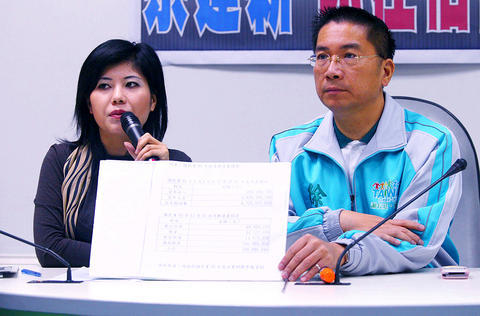Following President Chen Shui-bian's (
Chen raised eyebrows on Sunday night when he said during a campaign rally in Shulin (樹林), Taipei County, that he was considering four options -- declaring martial law, annulling the results of elections in pan-blue-controlled areas, replacing local election commission heads, or asking the Central Election Commission (CEC) to postpone the elections.
The CEC on Nov. 16 decided to use a one-step voting procedure in which voters will receive two ballots for the legislative elections and two referendum ballots at the same time and cast them into four different boxes.

PHOTO: CNA
However, 18 pan-blue local government chiefs insist on following a two-step voting process, whereby voters first cast their legislative election ballots before receiving their referendum ballots.
Chen reiterated yesterday that he would not impose martial law during his presidency. He said the then Chinese Nationalist Party (KMT) government did not do so after the devastating earthquake on Sept. 21, 1999, nor did he do so at the height of a campaign to oust him last year.
Urging the public to follow the CEC's decision, Chen said he believed the CEC would negotiate with the 18 counties and cities over the issue and that it would handle the matter in the most appropriate manner.
He criticized the opposition's attempt to boycott the one-step voting system as a move aimed at protecting the Chinese Nationalist Party's (KMT) "stolen assets" and opposing the government campaign to join the UN under the name Taiwan.
"Their purpose is to let Taiwan become part of China and prevent Taiwan from becoming an independent state," he said. "Voting is our constitutional right. The administration will do its best to protect this right and maintain order at polling stations."
A report in the Chinese-language United Daily News yesterday implied that TV political commentator Chen Li-hung (陳立宏) and political talk show host Cheng Hung-yi (鄭弘儀) were the instigators.
Chen Li-hung did not deny the speculation yesterday.
He told a TV program on SET-TV that the comments he made on a TV talk show dealt only with the voting dispute and were not targeted at any particular individual or party.
But Chen Li-hung dismissed talk that he advised the president on the matter because he, as well as the other guests and the host of the program, had not met or talked with Chen recently.
Nor were they planning to do so, he said.
Chen Li-hung also criticized the president for making such rash statements and misleading the public into thinking they were the troublemakers.
As the head of state, Chen is in no position to say that he is considering invalidating the election results, he said.
"Is that what a responsible politician should do?" he asked. "While he should be spending time and effort trying to figure out a way to deal with the problem, all he does is carry on stumping for DPP candidates."
Meanwhile, Legislator David Huang (黃適卓), a former member of the Taiwan Solidarity Union, yesterday revealed that his father, former TSU chairman Huang Chu-wen (黃主文), had made the recommendation that the CEC replace local election commission heads and delay the elections if necessary.

Alain Robert, known as the "French Spider-Man," praised Alex Honnold as exceptionally well-prepared after the US climber completed a free solo ascent of Taipei 101 yesterday. Robert said Honnold's ascent of the 508m-tall skyscraper in just more than one-and-a-half hours without using safety ropes or equipment was a remarkable achievement. "This is my life," he said in an interview conducted in French, adding that he liked the feeling of being "on the edge of danger." The 63-year-old Frenchman climbed Taipei 101 using ropes in December 2004, taking about four hours to reach the top. On a one-to-10 scale of difficulty, Robert said Taipei 101

Nipah virus infection is to be officially listed as a category 5 notifiable infectious disease in Taiwan in March, while clinical treatment guidelines are being formulated, the Centers for Disease Control (CDC) said yesterday. With Nipah infections being reported in other countries and considering its relatively high fatality rate, the centers on Jan. 16 announced that it would be listed as a notifiable infectious disease to bolster the nation’s systematic early warning system and increase public awareness, the CDC said. Bangladesh reported four fatal cases last year in separate districts, with three linked to raw date palm sap consumption, CDC Epidemic Intelligence

Taiwanese and US defense groups are collaborating to introduce deployable, semi-autonomous manufacturing systems for drones and components in a boost to the nation’s supply chain resilience. Taiwan’s G-Tech Optroelectronics Corp subsidiary GTOC and the US’ Aerkomm Inc on Friday announced an agreement with fellow US-based Firestorm Lab to adopt the latter’s xCell, a technology featuring 3D printers fitted in 6.1m container units. The systems enable aerial platforms and parts to be produced in high volumes from dispersed nodes capable of rapid redeployment, to minimize the risk of enemy strikes and to meet field requirements, they said. Firestorm chief technology officer Ian Muceus said

MORE FALL: An investigation into one of Xi’s key cronies, part of a broader ‘anti-corruption’ drive, indicates that he might have a deep distrust in the military, an expert said China’s latest military purge underscores systemic risks in its shift from collective leadership to sole rule under Chinese President Xi Jinping (習近平), and could disrupt its chain of command and military capabilities, a national security official said yesterday. If decisionmaking within the Chinese Communist Party has become “irrational” under one-man rule, the Taiwan Strait and the regional situation must be approached with extreme caution, given unforeseen risks, they added. The anonymous official made the remarks as China’s Central Military Commission Vice Chairman Zhang Youxia (張又俠) and Joint Staff Department Chief of Staff Liu Zhenli (劉振立) were reportedly being investigated for suspected “serious